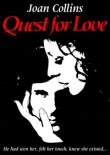 QUEST
FOR LOVE (1971)
QUEST
FOR LOVE (1971)Director: Ralph Thomas
Scorpion Releasing
 QUEST
FOR LOVE (1971)
QUEST
FOR LOVE (1971)A young physicist falls in love with Joan Collins in two parallel time lines in QUEST FOR LOVE, a sci-fi love story on DVD from Scorpion Releasing.
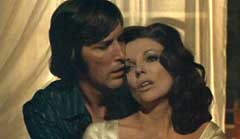
When an unspecified scientific demonstration goes awry, young physicist Colin Trafford (Tom Bell, STRAIGHT ON TIL MORNING) finds himself in an alternate reality where JFK was never assassinated, World War II never happened, Mount Everest was never climbed and men never walked on the moon. In his personal life, he is no longer a scientist. He is a successful author and playwright unhappily married to Otillie (Joan Collins, FEAR IN THE NIGHT) and sleeping with his leading lady Geraldine (Juliet Harmer, HOME BEFORE MIDNIGHT). His friend Tom (Denholm Elliot, THE HOUSE THAT DRIPPED BLOOD) is no longer the scientific correspondent for BBC, and is instead a Times film critic. He finds himself falling for the wife, but she takes his bizarre behavior as another of his mind games and his friends and business contacts think he’s hitting the bottle again. Trafford tracks down physicist Sir Henry Larnstein (Laurence Naismith, JASON AND THE ARGONAUTS) who was present at the demonstration in his reality. After Trafford gives Larnstein some equations demonstrating that some impossible theory was proven in his reality, Larnstein believes him but tells Trafford that the only way he can get Otillie to believe him is to regain her trust. Trafford sets about trying to romance his own wife, but eventually has to drag her to see Larnstein. Otillie decides to give Trafford a chance, while at the same time believing that the playwright is capable of dreaming it all up and fooling Larnstein into believing him. Tom has reservations about Trafford’s newfound faithfulness to Otillie and lets slip that she confided in him that she is dying. The operation that Trafford knows could save her has not been developed in this reality. Before she dies, Otillie tells Trafford to promise to find her other self if he gets back to his own reality. He then wakes up back in his own world and falls into a bout of depression (even trying to repeat the experimental mishap to travel to another plane) before trying to find his reality’s Otillie who may not know that she has the same heart condition and is living on borrowed time.
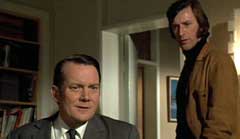 QUEST
FOR LOVE is based on a short story by John Wyndham, who is better known to film
viewers for the source novel for DAY OF THE TRIFFIDS as well as THE MIDWICH
CUCKOOS, which was adapted as VILLAGE OF THE DAMNED. The source story “Random
Quest” has been adapted twice for British television in 1969 and 2006.
I have not read the story but QUEST FOR LOVE is a bit of a frustrating watch,
and is not satisfying as romance or science fiction. While the production values
are nice with attractive cinematography by Ernest Steward (the CARRY ON series),
a lush-if-overwrought orchestral score by Eric Rogers (who was not related to
producer Peter Rogers, but scored over 30 of his productions) and great set
design by Robert Jones (the film was also an early credit for costume designer
Emma Porteus), television writer Terence Feely’s script and/or Ralph Thomas’
(the Simon Sparrow series with Dirk Bogarde) direction favors the love story
over the science fiction. There is no context for the “experiment gone
wrong” (which happens about a minute after the opening credits) or what
it was meant to achieve in the first place. We do not learn until almost 40
minutes into the film when Trafford meets up with Larnstein that the older man
had created controversy with his theory that time could be divided. We also
do not know what “impossible” theory Trafford proved to get Larnstein
to believe him. It’s all really “science fiction-lite” so
the film can get back to Joan Collins. The revelations about what hasn’t
happened in this reality are used to clue Trafford in to the realization that
he is indeed on a parallel plane of existence. There is no reflection on what
a world would be like where World War II had never happened and where JFK was
still alive (other than that somehow the operation that could save Otillie’s
life was never developed). Some of the necessary exposition may have been left
on the cutting room floor or never shot (when Trafford grabs his friend Tom’s
arm, there is a music sting; Tom had apparently lost that arm in Vietnam in
the other universe, but the film had not bothered to establish that).
QUEST
FOR LOVE is based on a short story by John Wyndham, who is better known to film
viewers for the source novel for DAY OF THE TRIFFIDS as well as THE MIDWICH
CUCKOOS, which was adapted as VILLAGE OF THE DAMNED. The source story “Random
Quest” has been adapted twice for British television in 1969 and 2006.
I have not read the story but QUEST FOR LOVE is a bit of a frustrating watch,
and is not satisfying as romance or science fiction. While the production values
are nice with attractive cinematography by Ernest Steward (the CARRY ON series),
a lush-if-overwrought orchestral score by Eric Rogers (who was not related to
producer Peter Rogers, but scored over 30 of his productions) and great set
design by Robert Jones (the film was also an early credit for costume designer
Emma Porteus), television writer Terence Feely’s script and/or Ralph Thomas’
(the Simon Sparrow series with Dirk Bogarde) direction favors the love story
over the science fiction. There is no context for the “experiment gone
wrong” (which happens about a minute after the opening credits) or what
it was meant to achieve in the first place. We do not learn until almost 40
minutes into the film when Trafford meets up with Larnstein that the older man
had created controversy with his theory that time could be divided. We also
do not know what “impossible” theory Trafford proved to get Larnstein
to believe him. It’s all really “science fiction-lite” so
the film can get back to Joan Collins. The revelations about what hasn’t
happened in this reality are used to clue Trafford in to the realization that
he is indeed on a parallel plane of existence. There is no reflection on what
a world would be like where World War II had never happened and where JFK was
still alive (other than that somehow the operation that could save Otillie’s
life was never developed). Some of the necessary exposition may have been left
on the cutting room floor or never shot (when Trafford grabs his friend Tom’s
arm, there is a music sting; Tom had apparently lost that arm in Vietnam in
the other universe, but the film had not bothered to establish that).
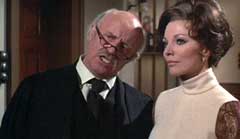
The romance angle is also rather limply developed. It is full of soft-focus shots, dissolves and chaste love scenes. Although a prestigious stage, film and TV actor, Bell (who died in 2006) is good, if a bland in his disorientation for most of the film; then he’s upstaged by Rogers’ bombastic orchestral score when required to show emotion. Collins does everything she does best in her pre-American fame roles. She looks good. She makes bitchiness attractive (Collins also appeared in QUEST producer Peter Rogers’ production REVENGE/INN OF THE FRIGHTENED PEOPLE), but her other self in Trafford’s reality is not given much time to develop as a distinct character. Third-billed Elliot is underused. In the alternate reality, he’s Otillie’s confidante and the target of the other Trafford’s jealousy; in Trafford’s reality he asks the questions that help Trafford convey the plot to the audience. Naismith is the one who breathes life into the film, even with his character’s amusing sexism (“You don’t explain to young ladies with this” Larnstein tells Trafford, pointing to his brain, “you explain with this” pointing to his heart, and he tells Otillie, “What young ladies believe, or what they don’t believe, has nothing to do with science”); both Bell and Collins are better in their scenes with him than they are in their scenes together. Simon Ward (HOLOCAUST 2000) appears briefly, early on.
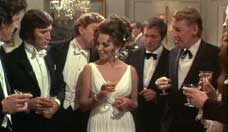 Scorpion’s
transfer opens up with a Rank logo and opening credits from an inferior source,
but the presentation improves once the film itself starts. Whites tend to be
a little noisy and it appears as if some sharpening may have been applied to
the master (which doesn’t really help for a film whose cinematography
gives its women the glamour treatment). The mono audio is fine with clear dialogue
and a fine rendering of the overwrought orchestral score. There is no scene
selection menu, but the film has been encoded with twelve chapters. There are
no extras for the film itself, but there are trailers for a handful of Scorpion
titles such as HOMO FABER/VOYAGER, SEXTETTE with Mae West and Ringo Starr, WHERE
THE BOYS ARE, SAY HELLO TO YESTERDAY with Jean Simmons and Leonard Whiting,
THE GIRL IN BLUE with David Selby and Maud Adams, FOOLS with Katherine Ross
and Sam Robards, SWEET WILLIAM with Jenny Agutter and Sam Waterson, and one
for Peter Sasdy’s NOTHING BUT THE NIGHT with Christopher Lee and Peter
Cushing. (Eric
Cotenas)
Scorpion’s
transfer opens up with a Rank logo and opening credits from an inferior source,
but the presentation improves once the film itself starts. Whites tend to be
a little noisy and it appears as if some sharpening may have been applied to
the master (which doesn’t really help for a film whose cinematography
gives its women the glamour treatment). The mono audio is fine with clear dialogue
and a fine rendering of the overwrought orchestral score. There is no scene
selection menu, but the film has been encoded with twelve chapters. There are
no extras for the film itself, but there are trailers for a handful of Scorpion
titles such as HOMO FABER/VOYAGER, SEXTETTE with Mae West and Ringo Starr, WHERE
THE BOYS ARE, SAY HELLO TO YESTERDAY with Jean Simmons and Leonard Whiting,
THE GIRL IN BLUE with David Selby and Maud Adams, FOOLS with Katherine Ross
and Sam Robards, SWEET WILLIAM with Jenny Agutter and Sam Waterson, and one
for Peter Sasdy’s NOTHING BUT THE NIGHT with Christopher Lee and Peter
Cushing. (Eric
Cotenas)